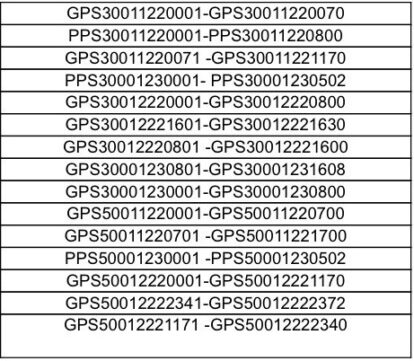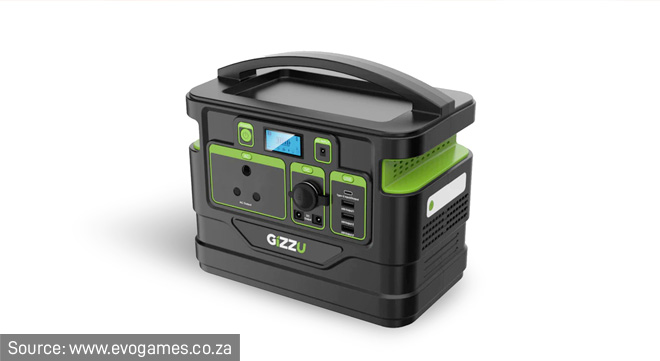The National Consumer Commission (NCC) has urged people who have Gizzu 300Wh and 500Wh portable power stations to stop using them and return the units to the supplier.
The commission estimated that 3 500 units of the power station were sold.
The call comes after Syntech, the distributor of the devices, received reports of “a small number” of the devices overheating while charging, posing a potential fire risk.
Syntech initiated a precautionary recall of the products and informed the NCC.
The South African technology distribution company said it contacted the manufacturer in China, which initiated an investigation. The investigation found that a temporary battery manufacturing flaw may have affected a small number of units in one batch of these models, produced between 1 November and 31 December 2022.
Daily Maverick quoted Syntech director and co-founder Ryan Martyn as saying the affected units were produced when the factory had been hit by a Covid-19 outbreak, which coincided with Syntech ramping up its orders to meet the demand from South Africa.
“The factory hired additional workers to assist with the process, but there appears to be a problem related to substandard welding or soldering of the batteries.”
The next batches, produced in January, benefited from a more precise laser soldering process, Martyn was quoted as saying.
According to Daily Maverick, as of Tuesday, only six Gizzus – one 500Wh and five 300Wh devices – have raised concerns after overheating and emitting black smoke. The devices were returned to retailers for refunds and/or replacements, in line with the Consumer Protection Act.
Syntech said it has engaged its retail and distribution partners to stop the sale of this limited batch of products. This will allow the company to retrieve, test and replace any affected units in this batch. Where possible, consumers who have been affected have been offered a refund or a replacement.
The portable power stations were distributed through multiple South African outlets, including Takealot.com, Builders Warehouse, Makro, Incredible Connection, and HiFi Corporation.
The NCC said consumers should look for the following product descriptions to determine whether their Gizzus are part of the recall:

Syntech also has an online tool to help consumers determine whether their unit is affected.
If you have bought a GPS300 or GPS500 Gizzu portable power station, visit www.syntech.co.za/gizzu-power-station-query-tool and enter the serial number. If your unit is affected, the site will provide guidance on how to proceed safely, and how to obtain a replacement or refund.
Ways to keep your lithium-ion battery safe
“Lithium-ion batteries are becoming increasingly popular for use in a range of devices, including inverter and solar batteries, battery back-up systems, and power banks. They are becoming a permanent presence in our homes and businesses,” Martyn said.
It is therefore important that consumers are aware of the potential risks of batteries and how to use them safely.
Syntech provides the following advice:
- Lithium-ion batteries are generally safe and unlikely to fail, but only if there are no defects and the batteries are undamaged. Damage from improper use, storage and overcharging may cause lithium-ion batteries to fail.
- Proper maintenance of lithium-ion battery products can help to prevent accidents and ensure improved performance and battery life. Keeping the product clean, ensuring that venting slots are clear of dust/obstructions, and ensuring that the product can cool itself effectively are vital for the upkeep of lithium-ion battery products. Periodic cleaning should be carried out without any liquids or compressed air.
- Syntech recommends the use of a universal voltage protector when charging lithium-ion battery products via AC input.
- Do not deplete lithium-ion battery products below 10% capacity because this can cause battery degradation.
- Do not use a lithium-ion battery product if it has been dropped, shows visible signs of damage/bulging, or emits irregular noises.
- Ensure that all connected devices, charging adapters, cables and extension strips are properly certified for intended use, as well as that they are compatible with your lithium-ion battery product. The use of third-party, inexpensive power cords and extension strips can result in damage to connected devices or to your lithium-ion battery products.
- Do not expose lithium-ion battery products to harsh environments. For example, do not leave the product exposed to direct sunlight, in very high temperatures, for extended periods.
- If your lithium-ion battery product is kept in a state of full charge, this may result in the battery ageing quickly. It’s best to use these products relatively soon after they’re fully charged.
- Do not make unauthorised changes or repairs to lithium-ion battery products. Doing so may cause damage to the product or render it unstable.
- Avoid recharging lithium-ion battery products overnight, unattended, and positioned near/on any flammable materials or surfaces.
- If your lithium-ion battery product becomes unusually hot while being used or charged, you should disconnect all devices and input charge immediately. It’s essential you let the product cool down away from any flammable materials and surfaces.
- In the unlikely event that a lithium-ion battery product fails and catches fire/starts smoking, use a standard ABC or BC dry chemical fire extinguisher to douse the flames. Lithium-ion batteries do not contain any actual lithium metal, so this will be sufficient. It is not advisable to use Ensure that you isolate a failed or damaged lithium-ion battery product from flammable materials and surfaces so that it can be properly contained.




Eish.
The day (afternoon) of us reading your report on the Gizzu GPS500 flaw, and getting a flawed unit report from Syntech for replacement of the flawed unit, the unit actually caught fire and was destroyed into a molten lump of plastic and metal.
A very timely read that we were totally unaware of.
Thanks
No where do you state that your powere station is made in China and not south africa.
You are at pains to state that it is a South african brand, but that is not true now is it,
Because of all the negative connotations attached to Chinese made goods in general.